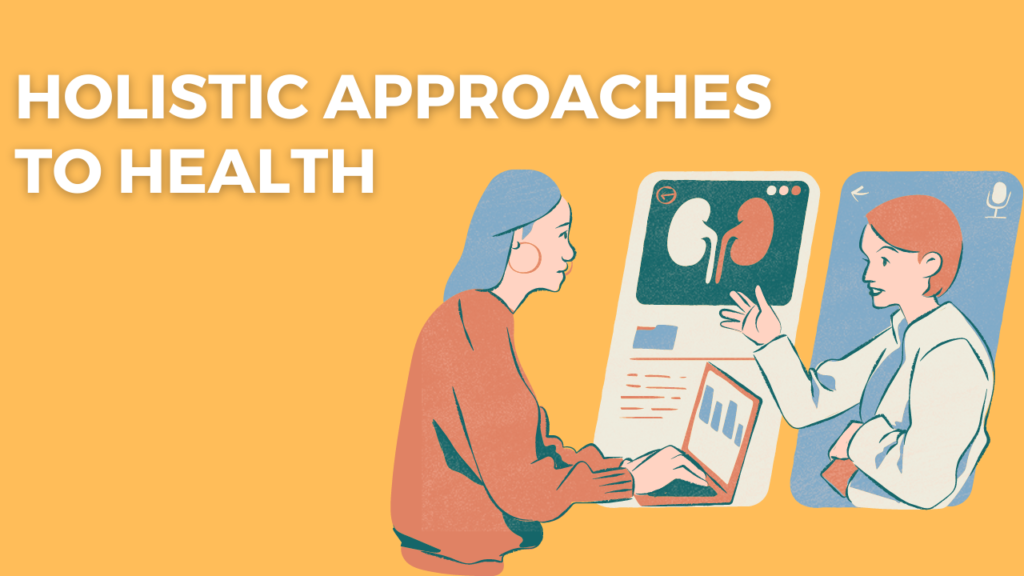Holistic Approaches to Health

Holistic approaches to health are based on the belief that the different aspects of a person’s well-being are interconnected and should be addressed together to achieve optimal health. Rather than focusing solely on physical symptoms or isolated issues, holistic health takes into consideration the individual’s physical, emotional, mental, spiritual, and social dimensions. This approach recognizes that imbalances in one area can affect other areas, and true health involves achieving harmony and balance in all aspects of life.
Here are some key principles and components of holistic approaches to health:
- Mind-Body Connection: Holistic health recognizes the strong connection between the mind and the body. Mental and emotional factors can significantly impact physical health, and vice versa. Practices such as meditation, yoga, and deep breathing exercises are used to promote relaxation and reduce stress, which can have positive effects on overall health.
- Nutrition: A balanced and nutritious diet is fundamental to holistic health. This includes consuming a variety of whole foods rich in vitamins, minerals, and other nutrients. Holistic nutrition also takes into account individual dietary needs and sensitivities.
- Physical Activity: Regular exercise and movement are essential for maintaining physical health and overall well-being. Holistic approaches emphasize finding activities that are enjoyable and sustainable for each individual.
- Emotional Well-being: Addressing emotions and finding healthy ways to express them is crucial in holistic health. Techniques such as mindfulness, journaling, and therapy can help individuals understand and manage their emotions.
- Spirituality: This aspect is not necessarily religious, but rather about connecting with a sense of purpose, meaning, and inner peace. Spiritual practices can include meditation, spending time in nature, and exploring personal beliefs.
- Social Relationships: Healthy relationships and a supportive social network contribute to overall well-being. Engaging in positive social interactions can boost mental and emotional health.
- Prevention: Holistic health emphasizes preventive measures rather than just treating symptoms after they arise. This involves adopting a healthy lifestyle, regular health screenings, and being proactive about self-care.
- Alternative Therapies: Holistic health often integrates complementary and alternative therapies, such as acupuncture, herbal medicine, chiropractic care, and aromatherapy. These therapies are used alongside conventional medical treatments to address a wider range of health issues.
- Environmental Factors: Recognizing the impact of the environment on health is another aspect of holistic approaches. This includes minimizing exposure to toxins, incorporating eco-friendly practices, and spending time in natural settings.
- Individualized Approach: Holistic health recognizes that each person is unique, so treatments and recommendations are tailored to the individual’s specific needs, preferences, and circumstances.
It’s important to note that while holistic approaches to health can be beneficial for many individuals, they are not a replacement for conventional medical care. Integrating holistic practices with evidence-based medical treatments can provide a comprehensive approach to health and wellness. It’s always a good idea to consult with healthcare professionals before making significant changes to your health regimen.
Holistic approaches to health are centered around the idea that the various aspects of an individual’s well-being are interconnected and should be addressed as a whole, rather than treating isolated symptoms or conditions. These approaches consider the physical, mental, emotional, social, and even spiritual dimensions of a person, recognizing that imbalances in one area can affect other areas as well. The goal is to achieve overall health and wellness by promoting harmony and balance in all aspects of a person’s life.
Here are some key principles and components of holistic approaches to health:
- Mind-Body Connection: Holistic health emphasizes the connection between the mind and the body. It recognizes that mental and emotional factors can influence physical health, and vice versa. Practices such as mindfulness, meditation, and yoga are often employed to foster a strong mind-body connection.
- Prevention: Holistic health focuses on preventing health issues before they arise, rather than just treating symptoms after they appear. This involves maintaining a healthy lifestyle, balanced diet, regular exercise, and stress reduction techniques.
- Individualization: Each person is seen as a unique individual with their own set of circumstances, genetics, and experiences. Holistic approaches take these factors into account when designing a health plan, recognizing that what works for one person might not work for another.
- Natural Healing: Holistic health often promotes the use of natural remedies and therapies, such as herbal medicine, acupuncture, chiropractic care, and dietary supplements. These treatments are believed to support the body’s innate ability to heal itself.
- Nutrition: Diet plays a crucial role in holistic health. A balanced and nutritious diet can contribute to overall well-being. Holistic nutrition focuses on whole, unprocessed foods and seeks to address individual nutritional needs.
- Emotional Well-being: Mental and emotional health are considered integral parts of holistic well-being. Techniques such as therapy, counseling, and emotional release practices are used to address psychological issues and promote emotional balance.
- Social and Environmental Factors: Holistic health acknowledges the impact of social interactions and the environment on a person’s well-being. Strong social support, positive relationships, and a healthy environment can contribute to overall health.
- Spirituality: While not always religious in nature, holistic health may incorporate elements of spirituality or a sense of purpose. Some individuals find that spiritual practices provide a sense of connection and meaning that contributes to their well-being.
- Holistic Therapies: Various holistic therapies are employed to address different aspects of well-being. These can include aromatherapy, massage therapy, energy healing (such as Reiki), and naturopathy.
- Lifestyle Changes: Holistic approaches often encourage individuals to make long-term lifestyle changes rather than seeking quick fixes. These changes might include adopting healthier habits, managing stress, improving sleep, and finding ways to relax and unwind.
It’s important to note that while holistic approaches can be complementary to conventional medical treatments, they are not a substitute for evidence-based medical care. Consulting with healthcare professionals and practitioners who are knowledgeable about holistic approaches can help individuals make informed decisions about their health and well-being.





